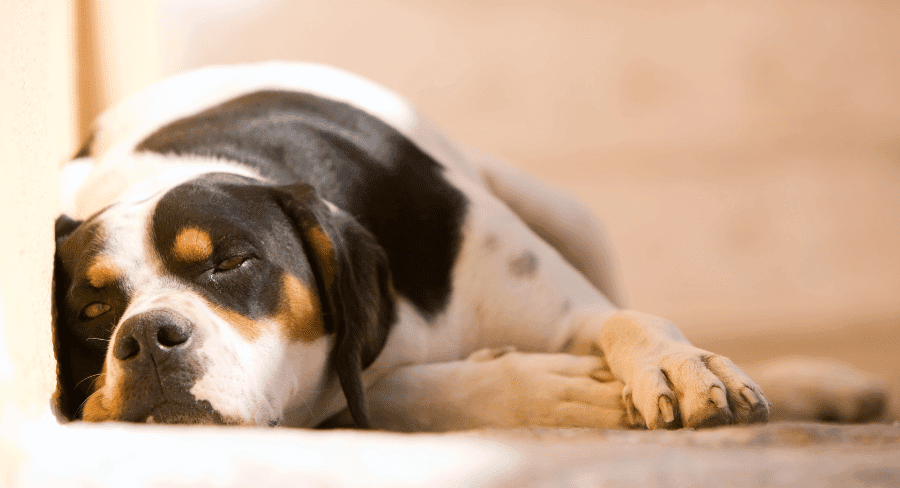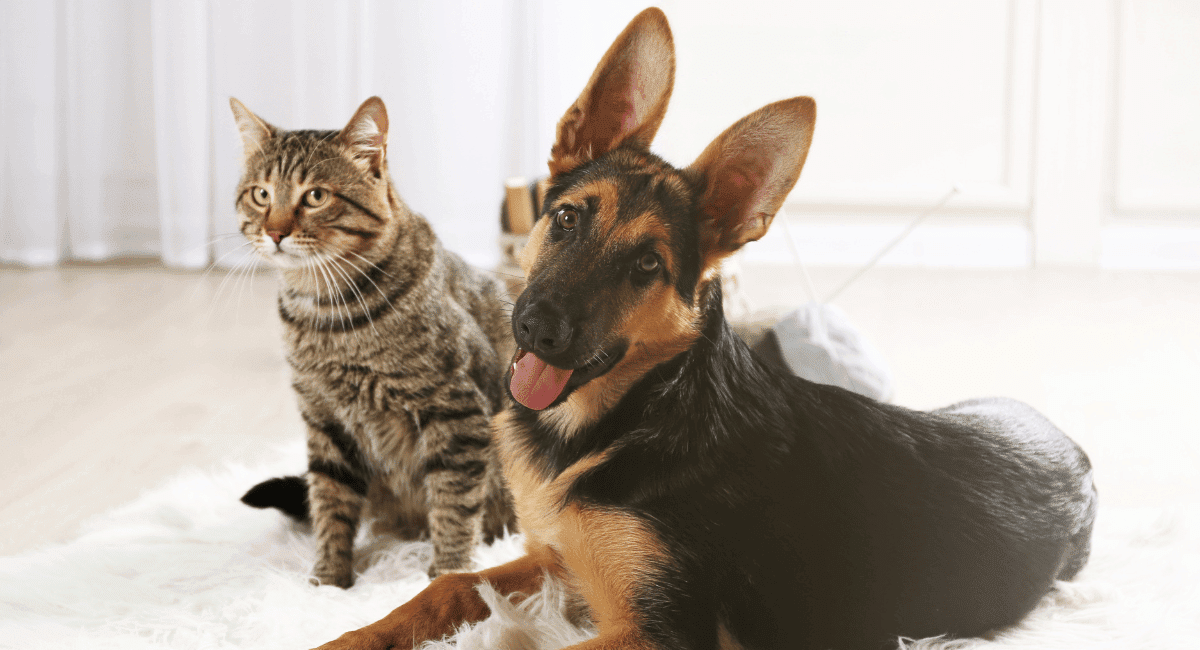If your dog is tired and sleeping a lot, gaining weight with no change in diet, or shedding their fur, you might just think that they're sick with a cold or dog flu. However, these may in fact be signs of a much larger problem, one that has to do with their thyroid. Your dog's thyroid problems can be hard to spot, as the symptoms (described in more detail below) may disguise themselves as other issues.
This article can help you learn more about dog thyroid disease, identify symptoms, and help manage them, especially if vet treatment is inaccessible or expensive. Some dogs are even more predisposed to the disease than others so be sure to check below to see if your dog is at risk.
Table of Contents
DOG THYROID - WHAT IS IT AND WHY IS IT IMPORTANT?
The thyroid is part of the endocrine system and is located in the front of the neck, with lobes on either side of the trachea.

There are a lot of different glands in the body, but the thyroid in particular produces very important hormones that help regulate many different functions including the metabolism, the immune system, heart health, and more. Thyroid disease is a type of autoimmune disease that can affect both humans as well as pets. The disease occurs when the thyroid gland produces either too much or not enough of the thyroid hormone.
When the thyroid makes too much thyroid hormone, the body uses too much energy causing the heart to beat faster. This condition is called Hyperthyroidism. On the other hand when the thyroid does not produce enough thyroid hormone, the animal generally feels tired, disoriented and can even gain weight as the metabolism slows down. This condition is knows as Hypothyroidism. Both conditions come with their own problems and affect pets differently.
WHEN PETS GET HYPERTHYROIDISM
Hyperthyroidism is a very rare condition in dogs, but cats tend to suffer it more commonly. Cat hyperthyroidism has many of the same symptoms as dog hyperthyroidism, but when it occurs in dogs it is very serious. The primary cause of dog hyperthyroidism is a type of cancer called thyroid carcinoma that would be diagnosed by your vet. The prognosis is determined by the size of the tumor, how much surrounding tissue is involved, and the stage of the cancer. Your vet can go over treatments for your dog and give medications to alleviate the thyroid symptoms.

Thankfully, this condition is rare in dogs, but it is still important to watch for possible symptoms so that any issues can be detected early on. Some of the symptoms of hyperthyroidism in dogs are:
- Weight loss
- Hyper-excitability
- Vomiting
- Increased appetite and thirst
- Increased urination
- Heart murmurs
- Diarrhea
- Shortness of breath
If you notice that your dog displays any of these symptoms it is best to get them checked by a vet right away. However, many of these signs are not exclusive to thyroid issues, so it's best to wait for a diagnosis before jumping to conclusions.
Another symptom that you may notice is an enlarged lump or goiter in the front of the neck. A goiter can occur when the thyroid gland, unable to produce enough hormones, grows bigger. They can also occur from iodine deficiency or too much iodine in the body. While goiters aren't too serious on their own, any swelling in your dog's necks should be checked out by a vet promptly to rule out anything serious, including hypothyroidism.
DOG HYPOTHYROIDISM SYMPTOMS
The most common type of thyroid issue that you will find is dog hypothyroid problems. Low thyroid function can cause a number of issues for your dog as it directly affects their metabolism and energy. Symptoms of a slowing metabolism like lethargy, weight gain, and changes in the coat such as dog fur loss are very common for a dog with this condition. Read on for a full list of symptoms to watch for; but note that not all dogs will display all symptoms, and they may not always show themselves at the onset. Many of the symptoms appear slowly and are only noticed over time as the underlying condition causes more damage to the thyroid.
While it is common to see these symptoms in cases of thyroid disease, some may also have other causes so it is important to get your pet checked out by a vet who can help rule out other illnesses. Some dogs are also more predisposed to thyroid disease than others; these breeds are listed below so be sure to check if your dog is at risk.
SIGNS OF HYPOTHYROIDISM IN DOGS MAY INCLUDE:
- Weight gain or obesity, without increased appetite
- Exercise intolerance
- Lethargy
- Mental dullness
- Cold intolerance
- Changes in the coat and skin
- Dog fur loss from increased shedding, including thinning coat or patchy fur
- Skin thickening or changes in skin pigmentation (usually a darkening of the skin)
- Increase in skin infections
- Ear infections, ear pain or redness
- Reproductive issues in intact dogs
Other less frequent signs include dilation of the esophagus which can cause regurgitation of food and difficulty swallowing, as well as muscle spasms and difficulty walking.

WHAT CAUSES HYPOTHYROIDISM IN DOGS?
Hypothyroidism in dogs is typically caused by damage to the thyroid gland. The most common cause is lymphocytic thyroiditis. This is an autoimmune condition that causes the dog's body to attack its own thyroid, the cause of which is unknown but may be partially due to genetics. Although autoimmune thyroiditis can start to develop as early as 2 to 5 years of age, dogs with this condition can appear normal for years before becoming hypothyroid at a later date (typically between the ages of 4 and 10).
One way to check if your dog is predisposed to this condition is to get a vet to test for autoantibodies. Development of autoantibodies at any time in the dog’s life is a good indication that the dog has a genetic predisposition to developing the disease later on.
The second most common cause is idiopathic thyroid gland atrophy, which is when the thyroid tissue is replaced by fatty tissue. This condition is poorly understood, but what is known is that these two causes account for about 95% of all hypothyroidism in dogs. The other 5% are typically a result of rare conditions including cancer.
If left untreated, symptoms usually worsen over time as more of the healthy thyroid is replaced. An important thing to note is that thyroid symptoms can also mimic symptoms of many other diseases. In order to avoid misdiagnosis, work closely with your vet to rule out other potential causes and get the proper treatment.
IS MY DOG AT RISK?
According to Washington State University, "hypothyroidism occurs more commonly in medium to large breed dogs and usually in middle aged dogs." Dogs with genetic predisposition or other autoimmune disorders may also be at risk.
The most commonly affected breeds include:
- Golden Retriever
- Doberman Pinscher
- Dachshund
- Akita
- Boxer
- Cocker Spaniel
- Beagle
- Irish Setter
However, many dogs can suffer from thyroid problems, and because the disease can be hereditary, if you know one of your dog's parents or other relatives dealt with thyroid issues, you should keep a close eye on them too.

TREATMENT FOR THYROID DISEASE
Thyroid disease is not typically curable but is manageable. A usual treatment to help rebalance or replace the levels of thyroid hormone involves thyroid hormone replacement therapy. This is usually done using a synthetic (lab-produced) hormone drug called levothyroxine or L-thyroxine that will be prescribed by your vet. Iodine is also needed for the production of the thyroid hormone; if your dog does not have enough iodine, then they cannot produce enough thyroid hormone. For this reason, some thyroid medication contains iodine to help in the production of the hormone. But you need to be careful as too much iodine can cause an over-production of the thyroid hormone leading to hyperthyroidism. Achieving the right balance is critical.
If you are looking for a more natural alternative or additional supplement to chemical drugs, a holistic vet can prescribe natural thyroid replacement remedies that typically have less side-effects. In either case, most dogs with thyroid disease will need to be on medication their whole life to help regulate the optimal function of the thyroid gland. There is good news, however, as the symptoms of thyroid deficiency can be managed successfully, especially with early detection.
Once your veterinarian finds the ideal hormone balance for your dog, they should bounce back quickly. This balance is decided based on your dog's weight and the results of their blood work. If your dog has autoimmune thyroiditis, blood work may show that their body created autoantibodies to attack thyroglobulin, a protein that is involved in the synthesis of the T4 and T3 hormone. These are both necessary to regulate your dog's wellbeing, so a vet may recommend to have a full thyroid panel done to check for these antibodies. If you suspect an autoimmune condition, you can ask your vet to do a full panel as it will help determine the best treatment for your dog.
In addition to thyroid replacement therapy your vet may also recommend a diet or pet supplement to help support healthy thyroid function. Some natural supplements, such as Hypo-Balance Thyroid Support for Dogs, are very effective at supporting optimal thyroid function and reducing or even eliminating most of the symptoms.
HELPING YOUR PET IF YOU CAN'T GET TO A VET
If your dog is suffering some of the symptoms and you suspect they may have a thyroid issue but your vet is closed or too far away, then do your best to ease their discomfort and provide supportive care. Natural thyroid support pet supplements and immune boosting remedies can help to give your dog more energy, regulate the production of the thyroid hormone and reduce symptoms.
If your dog is suffering from red or itchy skin then treating skin conditions and infections with creams, remedies or dog skin medicine can make your dog more comfortable. Some treatments may also help with dog fur loss, but fur may not regrow completely until the underlying cause is treated. Keeping your dog warm will also help, since a major symptom is intolerance to cold. You know your dog the best, so keep them comfortable as best you can until you are able to see a vet and get a proper diagnosis. On the bright side, remember that symptoms will improve once you find the right treatment and your fur baby will be back to their regular happy self.

SO, IS IT THYROID?
If your dog is feeling sleepy and looks like they broke into the snack cupboard, it may be just that! But if something seems not-quite-right, these could be signs of a larger issue.
Thyroid problems are scary for both you and your dog, and can be serious depending on the type of imbalance. It's important to do all you can to prevent any issues, including giving your pet a proper diet, keeping an eye out for symptoms, and ensuring their immune system and thyroid glands are strong and healthy. However, as long as you detect hyper- or hypothyroidism early and start managing their symptoms as soon as possible, your furry friend can bounce back and feel better in no time!
If you are interested in natural treatments to help your dog thrive, check out the health solutions available for your pets from BestLife4Pets. Contact us if you have any questions or want to learn more about how to keep your pet healthy.



